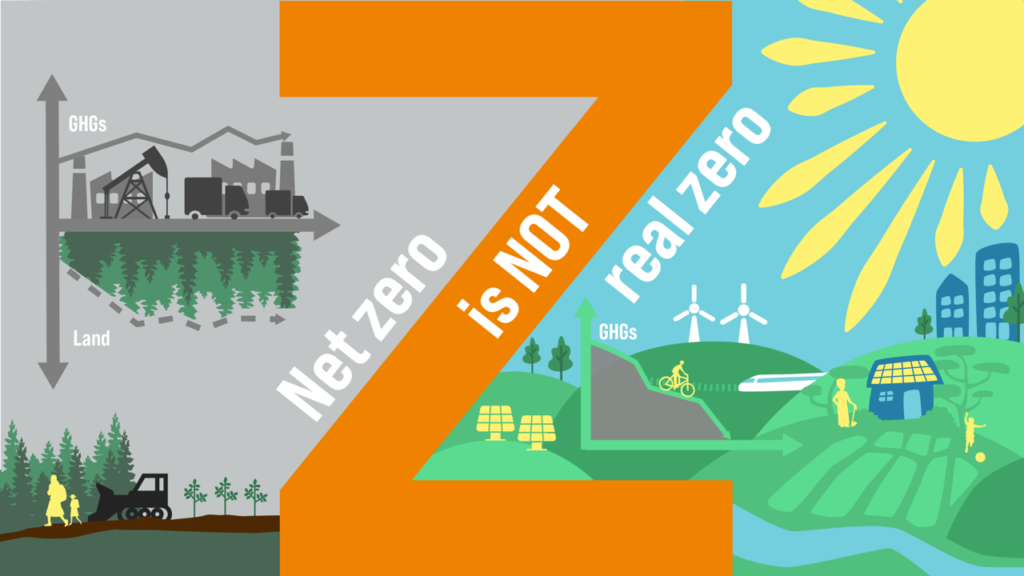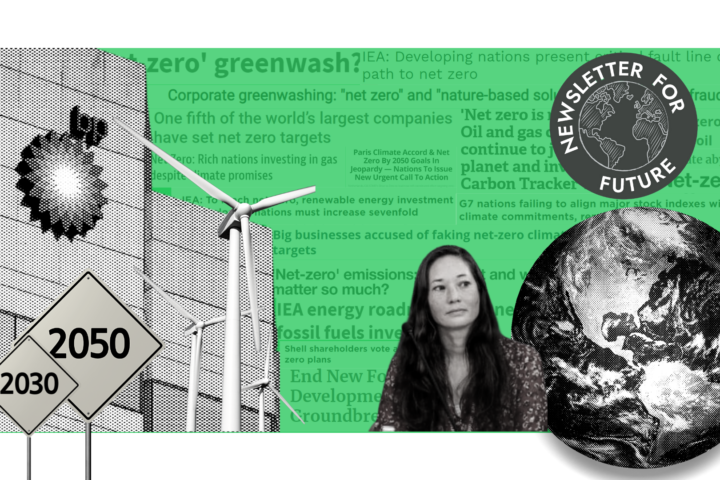At the heart of many environmental empty promises – from the claims of world leaders at events such as Biden’s Climate Summit, to the greenwashing from executives at fossil fuel companies like Shell – is the concept of the ‘Net Zero’ target. But what exactly does it mean? Can we put all our hopes on it? To delve further into the subject, we interviewed activist Teresa Anderson (@1teresaanderson), climate policy coordinator for ActionAid International, to discuss her perspective on Net Zero targets.
How would you define the term Net Zero?
“Net zero emissions” sounds a lot like “zero emissions” but can actually mean something very different. A “net zero” climate target basically means that as long as a corporation or government says they will remove the same amount of carbon dioxide from the atmosphere that they are polluting, then they can claim to be “net” zero. That might sound good for the climate. But actually there are a lot of problems, not least because removing CO2 from the atmosphere on a large scale is really difficult.

From a scientific perspective, what do you think the biggest issue with Net Zero targets is?

Firstly, “Net Zero by 2050” is obviously too little, too late. We need radical and transformative climate action to start now, and to ramp up over the decade to come.
The second problem is that instead of planning to cut emissions to real zero, most net zero climate targets include plans to continue polluting for decades, while hoping that trees or new technologies will suck CO2 out of the air to solve the problem. Net zero targets are being used to provide a smokescreen to allow companies to continue business-as-usual, while sounding more ambitious than they really are.
Consider the “Net Zero by 2050” target of just one corporation, Dutch company Shell. Instead of transitioning away from fossil fuels, they are actually spending far more on investment and exploration of oil and gas than they are on renewable energy over the next ten years. In order to claim to be on track for net zero, they plan to plant forests to absorb 120 million tonnes of CO2. ActionAid has calculated that this would require land up to three times the size of the Netherlands, the country where Shell’s headquarters are based.
Unfortunately, when you add together all the carbon offset components of the hundreds and hundreds of Net Zero targets announced by governments and corporations so far, this will need hundreds of millions of hectares of new tree plantations – spare land that the planet doesn’t have. Everyone is wrongly assuming that there is infinite land available to fix the problem. But there really isn’t.
Do you think that achieving net zero targets is possible without certain communities and countries having to suffer disproportionately?
It’s very likely that the majority of new tree plantations to meet Net Zero targets will be in the Global South, particularly tropical areas and fertile soils where trees grow fastest, and where communities often live on communal land instead of owning private property.
There’s a huge risk that they will drive massive land grabs, pushing farmers and indigenous peoples off their land. They may end up taking land away from producing food, leading to rising food prices and hunger.
Indigenous peoples, smallholder farmers, women and low-income families – who have done the least to cause the climate crisis, but who are already experiencing the worst impacts – will be particularly harmed by these developments.
What do you think about the proposed climate capture technology which is so important to achieving Net Zero – particularly, is it realistic?
Billions of dollars have been invested in Carbon Capture and Storage (CCS) technology over the last decades, yet it is still not working, and may never do so. Currently the process releases more emissions than it stores. It’s really very challenging to make CCS work as a climate solution. It’s incredibly irresponsible of governments and corporations to base their climate plans on technologies that have a high chance of never working. The only thing we know will work for sure is ending the fossil fuel era and transforming our energy, food, transport and economic systems as soon as possible.
Do you think that there’s any chance of the Net Zero strategy working to keep us below 1.5C warming?
We should judge climate targets on whether they are driving real transformation, and bringing actual emissions down to real zero or as close to zero as possible. Countries and industries with the greatest historic responsibility for causing pollution have to take the most action, urgently. In theory it’s possible that some individual Net Zero plans might be strong enough. However the slogan of “Net Zero” provides a convenient smokescreen that makes it easy for hundreds of governments and corporations to continue polluting business-as-usual.
I’m sorry to say that this means that the push for Net Zero is unlikely to drive the change that is needed to avoid runaway climate breakdown. To keep us below 1.5°C warming, we need to call for climate plans that drive real transformation and bring emissions down to real zero.

